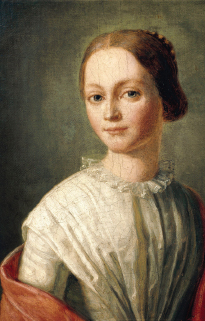Biography
Clara Wieck (Clara Schumann) (1819–1896)

Clara Wieck was the eldest child (she had two younger brothers) of a highly ambitious music teacher named Friedrich Wieck (pronounced Veek). Wieck had his own piano method, and he determined to make Clara a leading pianist. By the age of fifteen she was widely known as a prodigy. Like most virtuosos of the time, she also composed music to play at her own concerts: variations on popular opera arias, waltzes, a piano concerto.
Robert and Clara Schumann figure in what must be music’s greatest love story. Still, there seems to have been just a little friction between them because she was so much better a pianist; she, on her part, felt diffident about composing under his shadow, though he did encourage her to some extent, and they published one song cycle jointly, containing music by both of them. Clara often wrote songs to give Robert on his birthdays. The last of these is dated 1853, the year before he was committed to an insane asylum.
Even before that, Robert’s depression and instability made life difficult for Clara. She continued her career as best she could, but more and more she had to take care of the family. During the 1848 revolution in Leipzig, for example, it was up to her to get the five Schumann children out of town (three more were born later).
Things were difficult in another way when Robert died. At the age of thirty-
Today we tend to regret that Clara decided to give up composing, for she left enough good pieces to make us wish there were more. But she knew it would have been an uphill battle, given the common nineteenth-
Clara Schumann went on to further establish herself as one of Europe’s leading pianists and a much-
Chief Works: Miniatures for piano, with names such as Romances and Soirées musicales (Musical Evenings); songs ◼ A piano concerto and a trio for piano, violin, and cello ◼ Piano Variations on a Theme by Robert Schumann (Brahms wrote a set of variations on the same theme)
Encore: After “Der Mond,” listen to Romances for piano and the piano concerto.
Image credit: De Agostini Picture Library/A. Dagli Orti/Bridgeman Art Library.